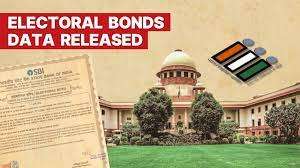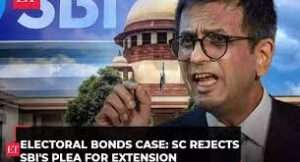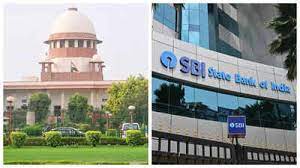Electoral Bonds Case – SBI Should Disclose Numbers: Dive into the latest developments surrounding bonds as the case unfolds. Explore why transparency matters and why SBI’s disclosure of numbers is under scrutiny. Stay informed and gain valuable insights into the implications of this crucial legal battle. Delve into the intricacies of electoral financing and its impact on democracy. Understand the significance of transparency in the electoral process and how it shapes public trust in governance. Keep up-to-date with the latest updates and analysis on the Electoral Bonds Case and its potential ramifications. Don’t miss out on this essential coverage of one of India’s most significant legal battles shaping the future of electoral financing.
Understanding Electoral Bonds: An Overview


Introduced in 2018, are a contentious aspect of Indian political financing. These monetary instruments enable anonymous donations to political parties, ostensibly streamlining the donation process while safeguarding donors’ identities. However, concerns have arisen regarding their impact on transparency and accountability in the electoral process. Critics argue that the anonymity provided by eb hampers efforts to trace the flow of funds and hold parties accountable for their financial transactions. As debates continue, it’s crucial to grasp the complexities surrounding eb and their implications for democratic governance in India. Stay informed to navigate discussions surrounding electoral financing effectively.
The Importance of Transparency in Electoral Financing
- Upholding Democratic Values: Transparency in electoral financing is essential for maintaining the integrity of democratic elections.
- Preventing Corruption: Transparent financial practices help prevent corruption and undue influence in the political process.
- Ensuring Accountability: Transparency enables voters to hold political parties and candidates accountable for their financial activities.
- Building Trust: Openness in electoral financing builds trust between citizens and the political system, fostering a healthy democracy.
- Leveling the Playing Field: Transparency helps level the playing field by ensuring fair competition among political parties.
- Curbing Illicit Activities: Transparent financing mechanisms deter illicit activities such as money laundering and illegal contributions.
- Enhancing Public Confidence: Transparent electoral financing instills confidence in the electoral process and encourages greater civic participation.
- Facilitating Oversight: Transparency facilitates effective oversight by regulatory bodies and promotes adherence to electoral laws.
- Promoting Fairness: Transparent disclosure of financial contributions promotes fairness and prevents undue influence from wealthy donors.
- Strengthening Democracy: Overall, transparency in electoral financing is crucial for strengthening democratic institutions and upholding the principles of accountability and fairness.
Legal Implications of SBI’s Disclosure in the Electoral Bonds Case


The legal implications of the State Bank of India’s (SBI) disclosure in the Bonds Case are far-reaching and have sparked intense scrutiny from various quarters. As the central bank entrusted with managing electoral bonds, SBI’s decision to disclose key information could have significant ramifications for electoral financing laws and regulations. The disclosure may potentially shed light on the extent of political funding and the identities of donors, addressing longstanding concerns about transparency and accountability in the electoral process.
However, it also raises complex legal questions regarding privacy rights, donor confidentiality, and the balance between transparency and secrecy in political financing. The outcome of this legal battle could set a precedent for future cases involving and shaping the landscape of electoral financing in India. Stay tuned for updates on the legal proceedings and their implications for electoral transparency and accountability.
Impact of Electoral Bonds on Indian Democracy
The impact of bonds on Indian democracy is a topic of intense debate and scrutiny. While proponents argue that bonds streamline the donation process and protect donor privacy, critics raise concerns about transparency, accountability, and the influence of money in politics. The anonymity afforded by electoral bonds has led to questions about the fairness of elections and the potential for undue influence from wealthy donors.
Furthermore, the lack of disclosure regarding donors’ identities raises doubts about the integrity of the electoral process and erodes public trust in democratic institutions. As the debate continues, it is essential to evaluate the long-term implications of bonds on Indian democracy and consider reforms to ensure transparency and fairness in electoral financing. Stay informed to engage meaningfully in discussions surrounding electoral reform and democratic governance.
Calls for Reform: Addressing Transparency Concerns in Electoral Financing
Calls for reform are mounting as concerns about transparency in electoral financing gain traction. Stakeholders advocate for increased disclosure requirements and tighter regulations to ensure accountability and fairness in the electoral process. Addressing transparency concerns is crucial for restoring public trust in democratic institutions and safeguarding the integrity of elections. Stay updated on efforts to reform electoral financing practices and advocate for measures that promote transparency and accountability in political finance.
Frequently Asked Questions

